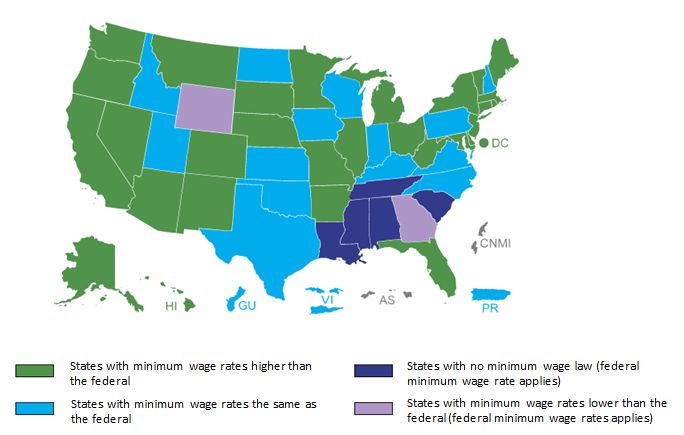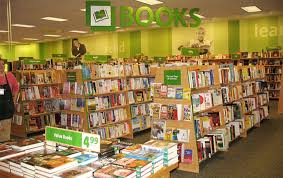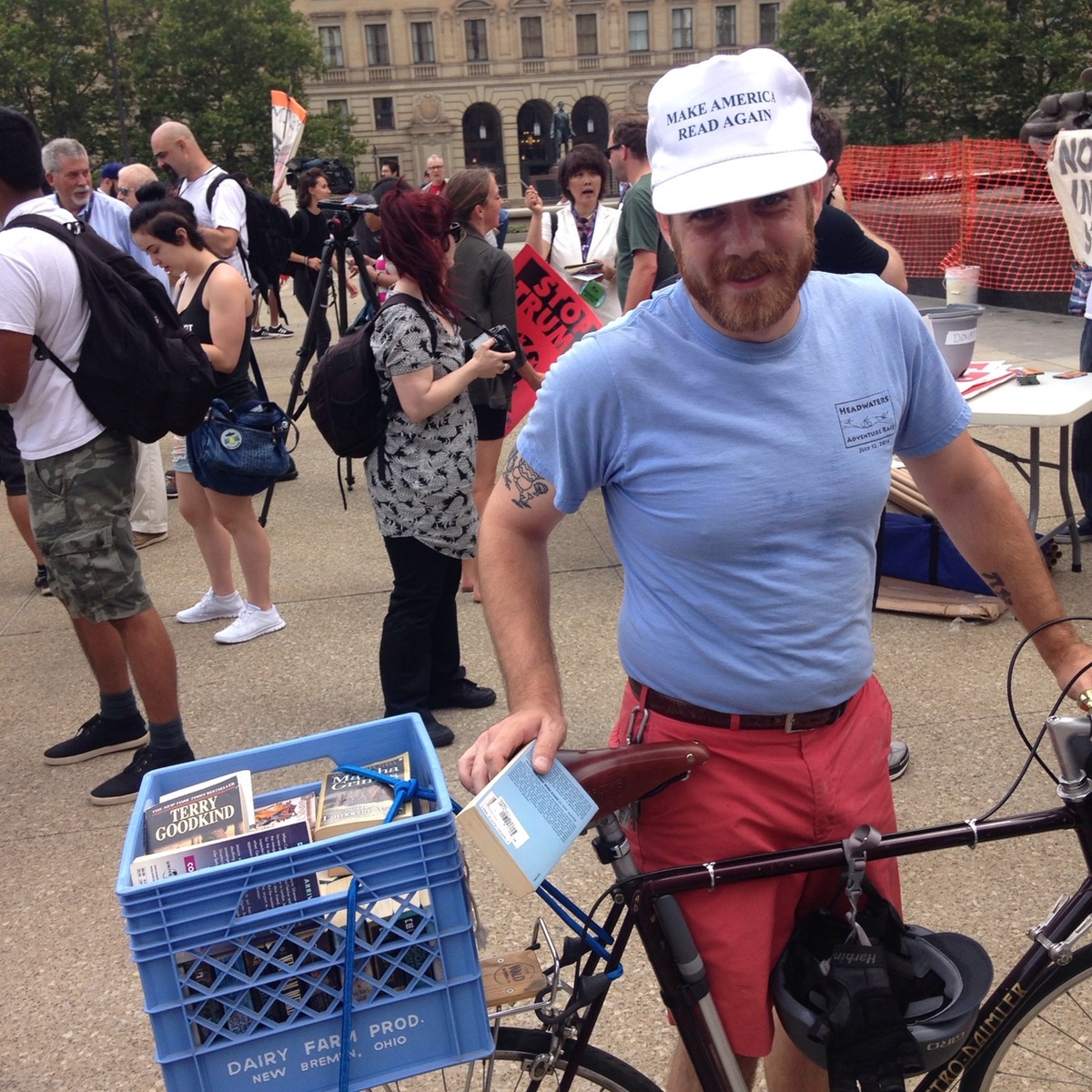In the two years since the City Council of Seattle, Wash., approved an ordinance to raise the city's minimum wage to $15 per hour, similar measures have been proposed or signed into law in several states and municipalities around the country, and are already affecting many hundreds of booksellers. Most store owners favor the rise in minimum wages in principle but worry about the financial effect in a business with narrow margins.  Today, in the first of a multi-part series, Shelf Awareness looks at how booksellers in California are reacting to the hikes in minimum wage, from looking for cost savings in a range of areas to evaluating work schedules, from adding products and services with higher margins than books to hoping for some help from publishers, whether with improved terms, the end of printed prices on books or other measures.
Today, in the first of a multi-part series, Shelf Awareness looks at how booksellers in California are reacting to the hikes in minimum wage, from looking for cost savings in a range of areas to evaluating work schedules, from adding products and services with higher margins than books to hoping for some help from publishers, whether with improved terms, the end of printed prices on books or other measures.
Earlier this year, California governor Jerry Brown signed legislation mandating that the state's minimum wage reach $15 per hour by the end of 2022. Included in the bill are measures for small businesses--defined as those with fewer than 26 workers--to phase in each increase at a slightly slower rate, as well as the option for the state government to postpone planned wage increases in the event of an economic downturn. At the same time, some cities in California, including San Francisco, Berkeley and Los Angeles, have enacted their own minimum wage laws with different provisions and on different timeframes than the statewide law.
 |
| Allison Hill, Vroman's and Book Soup |
"Everything is on the table at this point," said Allison Hill, president and CEO of Vroman's Bookstore in Pasadena and Book Soup in West Hollywood. "We've always operated with this mentality, but the stakes are far greater now, and as a result we're more focused."
At the moment, the minimum wage is higher in Pasadena than in Los Angeles proper, and the minimum wage in West Hollywood is set to raise at a slightly slower rate. Still, employees at both stores are being paid in line with Pasadena's higher minimum wage. (For businesses in Pasadena with more than 26 employees, the minimum wage is now $10.50 an hour and rises to $12 next July 1 and $13.25 on July 1, 2018.) According to Hill, the city of Pasadena did provide small businesses with the opportunity to be heard, and the Chamber of Commerce was active in representing small business interests. "That said," Hill commented, "I still don't think the city fully understands the impact on local businesses and the local economy."
Among other things, Hill and her staff are evaluating whether the stores are open optimal hours, if there are technological systems that could help cut costs and if the company should consider self-funding health benefits. They're also reconsidering a range of pricing and merchandising matters. As for industry-wide changes, Hill wondered how publishers might help support independent bookstores, possibly by removing prices from books, offering automatic percentage credits in lieu of returns, giving extra percentage points for paying early, and more.
"I care about the people in our store that make this dream possible, and I want them to be fairly compensated," said Hill. At the same time, she emphasized, booksellers and publishers need to start thinking about the future now. "Otherwise when the full impact of the minimum wage increases is realized in a couple of years, we're all in for a rude awakening."
In San Francisco, the minimum wage increased from $12.25 to $13 per hour on July 1. Next July, it will rise to $14 per hour and, at the start of July 2018, will hit $15 per hour. On July 1 each following year, the minimum wage will increase in accordance with the Consumer Price Index.
 |
| Christin Evans, Kepler's and Booksmith |
Christin Evans and her husband, Praveen Madan, operate two independent bookstores in the Bay Area: the Booksmith, in San Francisco's Haight-Ashbury neighborhood, and Kepler's Books in Menlo Park. Though Menlo Park is on the slower schedule that the rest of California will follow, Kepler's employees are being paid on the same scale as those at the Booksmith, which is higher than the current San Francisco minimum wage of $13 an hour. "It [the minimum wage] definitely has been going up at a pretty high clip," said Evans. "That being said, the cost of living has gone up even more."
Because of the challenge of "retaining and attracting key staff" in San Francisco and the Bay Area, the Booksmith and Kepler's have always paid above the minimum wage. As a result, Evans said, the steep jumps in minimum wage have not had a "catastrophic impact" on the business. In addition, Evans pointed out that over the last decade, booksellers have repeatedly faced things that were thought to be "existential threats," including the explosive growth of e-books, the rise of Amazon.com and e-commerce, and even the financial crisis of 2008. To protect the stores against those and future events, Evans has been looking at ways to diversify revenue and manage costs for years. She pointed to Shipwreck, a monthly Booksmith series in which six writers compete by reading erotic fan fiction based on literary works, as an example of a new source of revenue that has been great for both audiences and the store.
Evans said that she has been active in supporting an increased minimum wage in San Francisco, but acknowledged that the issue weighs much more heavily on some stores. In San Francisco, she reported, most small businesses were supportive of raising the minimum wage, and added, "Ultimately the concern was about making sure those changes were done in ways and at a speed where people can absorb them."
 |
| Michael Tucker, Books, Inc. |
Michael Tucker, president of Books Inc., which has 11 stores in the Bay Area, said that the sky is certainly not falling, but unprepared stores could be "hit like a ton of bricks" due to wage increases. One of the major complicating factors he pointed to is the effect that raising base level salary has on management and higher-level salaries. "You don't want disparity," Tucker explained. "Even those areas not mandated to getting a raise, we're raising those up."
Tucker also expressed concerns about another severe economic downturn in the future. Since he's been in charge of Books Inc., he said, he's seen the San Francisco economy plummet twice, once when the "dot-com bubble" burst in 2000 and again in 2008 during the broader financial crisis. In 2008, Tucker recalled, Books Inc. was able to avoid layoffs by freezing wages and furloughing a month of salary for those in "main office" leadership positions. Although California's statewide minimum wage law gives the governor authority to freeze wages in such an event, that is not allowed for in San Francisco's minimum wage law.
Over the years, Tucker said, Books Inc. has increased its sales mix from about 2% in gifts to around 15% currently. The impetus for this was a sudden, severe drop in the remainders market and a need to make back some of that lost margin. Initially, Tucker recalled, there was some staff pushback against selling more gifts, that's disappeared. Tucker said he would highly recommend that any bookstore not selling gifts do so.
Given the exorbitant cost of living in San Francisco and other parts of the Bay Area, Tucker was unsure about the idea that these wage increases would lead to more discretionary spending. It might turn out differently in other areas, he said, but he imagined that in San Francisco, the majority of extra income will be used to pay for essentials.
On an industry-wide level, Tucker said he was unsure of the best way forward, but called cooperation with publishers essential. Due to the federal antitrust lawsuit, he noted, publishers are gun-shy about pricing discussions, but changes to returnability could be part of a solution. Fixes made over the next few years, he added, could amount to a sea-change for the publishing industry.
Publishers recognize the seriousness of the problem, he added, "because if we go down, that becomes really problematic." --Alex Mutter
 Hastings Entertainment, which filed for bankruptcy in June and has some 125 superstores in medium- and small-sized markets that sell new and used books in the multimedia media mix, is being liquidated and all stores will close by October 31, according to the Amarillo Globe-News.
Hastings Entertainment, which filed for bankruptcy in June and has some 125 superstores in medium- and small-sized markets that sell new and used books in the multimedia media mix, is being liquidated and all stores will close by October 31, according to the Amarillo Globe-News. Some money from the sale of Hastings will go to Bank of America and Pathlight Capital, which provided the company capital during the bankruptcy proceedings. General creditors are also guaranteed some 75% of their debt.
Some money from the sale of Hastings will go to Bank of America and Pathlight Capital, which provided the company capital during the bankruptcy proceedings. General creditors are also guaranteed some 75% of their debt.





SHELFAWARENESS.0213.S4.DIFFICULTTOPICSWEBINAR.gif)




 PEN America has established the
PEN America has established the 

SHELFAWARENESS.0213.T3.DIFFICULTTOPICSWEBINAR.gif)
 Today, in the first of a multi-part series, Shelf Awareness looks at how booksellers in California are reacting to the hikes in minimum wage, from looking for cost savings in a range of areas to evaluating work schedules, from adding products and services with higher margins than books to hoping for some help from publishers, whether with improved terms, the end of printed prices on books or other measures.
Today, in the first of a multi-part series, Shelf Awareness looks at how booksellers in California are reacting to the hikes in minimum wage, from looking for cost savings in a range of areas to evaluating work schedules, from adding products and services with higher margins than books to hoping for some help from publishers, whether with improved terms, the end of printed prices on books or other measures. 


 Tuesday night, at a jam-packed, SRO event at
Tuesday night, at a jam-packed, SRO event at 

 Vermont editor Angela Palm grew up in a struggling rural Indiana community on the banks of the Kankakee. The river had been straightened to yield farmland, but it frequently flooded back to its original shape, turning each house into an island. Palm's greatest happiness lay in her love for the boy next door; she fell asleep each night watching him through their bedroom windows. She dreamt of escaping her troubled home life, even without a clear idea of what escape might mean. And then the boy next door was sentenced to life in prison for a horrible crime.
Vermont editor Angela Palm grew up in a struggling rural Indiana community on the banks of the Kankakee. The river had been straightened to yield farmland, but it frequently flooded back to its original shape, turning each house into an island. Palm's greatest happiness lay in her love for the boy next door; she fell asleep each night watching him through their bedroom windows. She dreamt of escaping her troubled home life, even without a clear idea of what escape might mean. And then the boy next door was sentenced to life in prison for a horrible crime.